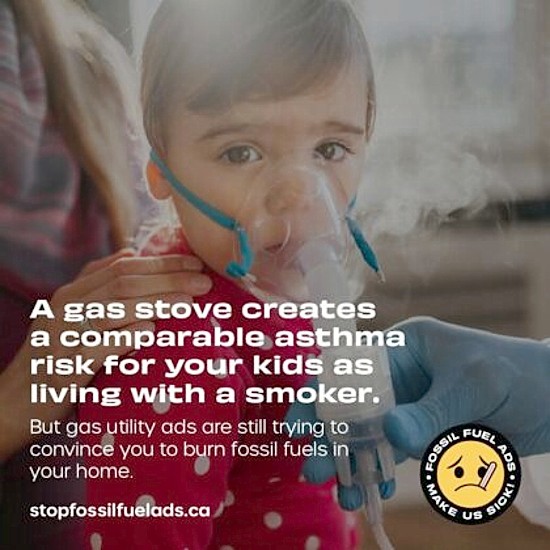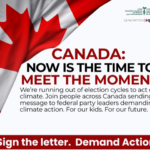The Canadian Association of Physicians for the Environment (CAPE) on June 8th, 2022, an organization representing more than a half-million health professionals, called for a ban on fossil fuel advertising. The ban is not aimed just at the energy companies responsible for extracting, refining and distributing oil and gas, but also at those in the automobile industry who promote products running on fossil fuels.
The President of CAPE, Dr. Joe Vipond, stated in a media announcement, “Climate change is a public health crisis. Air pollution from the burning of fossil fuels is already one of the leading causes of premature mortality in Canada.”
Just how much does fossil fuel air pollution contribute negatively to global health. A recent Lancet report states that it is responsible for 8.7 million deaths annually. That’s 1 in 5 deaths globally, and 1 in 7 premature deaths in Canada every year.
The idea of an advertising ban on a harmful industry is not new. A similar campaign against cigarettes and the tobacco industry eventually led to a ban on cigarette advertising and tobacco products in Canada in 1988.
In a letter campaign entitled “Fossil Fuel Ads Make us Sick,” CAPE is asking Canadians to send a message to key members of the federal cabinet including the Ministers of Canadian Heritage, Environment and Climate Change, Natural Resources, Health, and Innovation, Science and Economic Development. The letter notes that there is a direct link between public health and the burning of fossil fuels negatively affecting “the physical health, quality of life, mental health, and longevity of people” in the country.
It’s not like the federal government doesn’t already know this. In February of this year, it released a report entitled “Health of Canadians in a Changing Climate: Advancing Our Knowledge for Action.” That report detailed linkages between climate change and the well-being of Canadians looking at mental health, air, water and food quality and security, infectious diseases, and impacts on the Indigenous peoples within the country.
The report’s executive summary calls for “concerted action” to address adverse health effects being meted on Canadians from the pollutants that fossil fuels add to both outdoor and indoor environments. It notes that fossil fuel air pollution today kills between 15,000 and 34,000 Canadians annually. And natural gas use in homes is linked to a 24 to 42% increased risk of children in those homes developing asthma.
The President and CEO of Asthma Canada, Vanessa Foran, when asked to comment on the CAPE initiative stated, “Canadians with asthma are disproportionately affected by poor air quality. But all Canadians deserve to breathe clean air. It is time for a clear-eyed look at the evidence. Fossil fuel advertising fails to disclose known health and environmental hazards. We owe it to the next generation to act on this evidence.”
A CAPE Board Member, Dr. Claudel Pétrin-Desrosiers, pointed out, “Restricting fossil fuel advertising is a concrete action we can take today to improve the health of people in Canada and address climate change at the same time…It makes no sense to promote polluting fossil fuels which are damaging people’s health and which the world needs to transition away from.”
In asking for the ban on fossil fuel marketing and promotion, CAPE is requesting it be done with the “same resolve, and the same tools, that were used to combat…the fight against tobacco.” Their proposal would include an advertising ban on:
- gasoline
- fossil fuel utilities
- gas-powered vehicles
CAPE is also calling for the complete disclosure of health risks to the public from these products.
I have known about CAPE since its founding in 1993. My brother, David, first introduced me to the organization back then. David, today, is a semi-retired physician. Back then he talked to me about his concerns for young patients in his practice that were being affected by ground-level ozone from tailpipe emissions from idling cars on urban streets. At that time I was unaware of the link between ground-level ozone and rising levels of asthma in children.
Back in April this year I wrote a posting about my brother presenting CAPE’s concerns to a city planning committee about suburban sprawl and links to adverse health outcomes. And lately, I have been working with the Ontario Climate Emergency Coalition of which CAPE is an active participant.
But back in the 1990s, CAPE was much quieter when it came to making its positions known or lobbying the government on health and environmental issues. Recent activities, however, point to medical professionals becoming activists in defence of the environment. This seems to be a growing trend that is also seeing scientists becoming activists on environmental and climate change issues.
The current Fossil Fuel Ads Make us Sick letter campaign is one that I would think every parent or person who knows a friend or family member suffering from a respiratory condition should sign. I know what tobacco did to my father. I don’t what gasoline to do the same to my granddaughter. Your action in support of this lobbying campaign may just save her and others’ lives.









